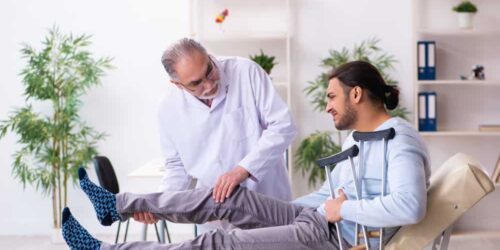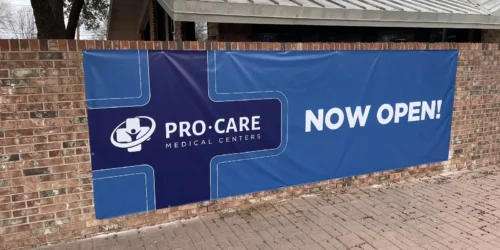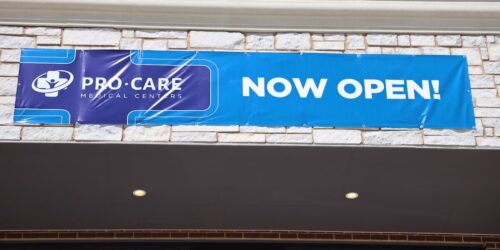No one wants to be in a car accident — one minute you’re driving, listening to your favorite podcast or playlist, and then your trip takes a detour: A collision was not on your bingo card for the day. A car accident can be incredibly stressful, and potentially incredibly painful.
In the immediate aftermath of a collision, you might find yourself overwhelmed or in shock. If you suffered any injuries, you could end up missing work and find yourself dealing with expensive hospital bills. These responses to a traumatic event like a car accident are normal, though they can certainly make talking to police, navigating insurance, and making sure you’re OK difficult.
That’s why we’ve compiled this guide to break down each step and provide helpful guidance through the whole process. Keep in mind that this information is specific to Texas and while most states have similar laws and processes, there might be some slight variations depending on where you’re located.
What to Do After a Car Accident: 9 Tips for a Smoother Recovery
After a car accident, the immediate steps you take can have a significant impact on your health and recovery. While every accident is different, there are some common steps that should always be taken. Whether a minor fender bender or serious wreck, you should:
- Immediately check yourself and your passengers for injuries
- Stay at the scene and call the police
- Take note of injuries and get urgent medical attention
- Document everything
- Preserve any car accident evidence
- Exchange info with other parties involved
- Inform your insurance company
- Take the time to rest after the accident
- Follow up with a car accident chiropractor
Let’s discuss each of these, including why they’re important, in more detail.
1. Immediately Check Yourself & Your Passengers For Injuries
Following a car accident, it’s important to remain calm. Assess yourself and your passengers for injuries. If you have a first aid kit in the car, you should try to attend to any injuries you can. Remember to take a deep breath — this can help bring your adrenaline down and allow you to manage the situation better.
2. Stay at the Scene & Call the Police
If you get into a car accident, you should never leave the scene until police are done talking to everyone. In fact, all drivers involved in a car accident in Texas are required to stop, or else they risk being charged with leaving the scene of an accident. Even if you think the car accident wasn’t a big deal or don’t see any obvious signs of damage or injuries, it’s always best to get a police report of the incident.
In the event of an accident, immediately turn on your hazard lights and call 9-1-1 as soon as you are able. This will allow you to get an official record of what occurred, as well as information from the other party. If you end up needing to work with your insurance company, they’ll want to see a police record to confirm the details of the accident.
3. Take Note of Injuries & Get Urgent Medical Attention
Once you’ve called the authorities and they’re on the way, take another moment to assess for any injuries. Take notice of any pain you might be experiencing or obvious signs of injuries like bleeding. If you experience pain or difficulty moving your head, neck, or back, stay very still until emergency responders come to the scene. Paramedics have the expertise to rule out serious injuries or to help get you to safety without further aggravating your injuries. You should always get checked out by a doctor after a car accident, whether you need medical attention at the emergency room or follow up with a car accident doctor near you.
Still feeling sore after a recent accident? Schedule an appointment with our team of specialists to make sure you’re on the road to recovery.
4. Document Everything
Documentation is vitally important for a car accident claim. Try to write down some notes or add a voice memo to your phone of everything you remember immediately after the accident, including what direction you were traveling and the make and model of other car(s) involved. Make a note of any obvious signs of injury you or other passengers are experiencing, including pain, bleeding, and other symptoms.
If you are able to move around safely, try to take photos or videos of the car accident site, which might have additional information or context you didn’t notice initially. You should also take a photo of other vehicles involved in the accident, including their license plates.
5. Preserve Any Car Accident Evidence
If your car is in a dangerous position, such as in the middle of the road where you or others could be at risk, it is important to get out of harm’s way. If the accident does take place where you can stay put, this allows you to preserve any potential evidence for a full police report of the accident. Again, any photos or video you can take at the scene may be helpful for the authorities to review to help support a full and accurate police report. For example, if the other driver clipped the curb and veered into you, photos of that impact site could be helpful for evidence that you can share with the attending officers at the scene.
6. Exchange Info with Other Parties Involved
Texas law requires that all drivers involved in a car accident must exchange insurance information at the site of the car accident. You can do this while waiting for the police to arrive. While police reports may include this information as well, you shouldn’t rely on the police to gather and share this information with all parties. Instead, exchanging insurance coverage information directly can help expedite the process.
Another reason is that it can take a days or even a week to receive the full police report of the car accident, but you will likely need the driver’s insurance and information to get started on a claim sooner than that.
Make sure you get the following info from the other driver:
- Name of the driver
- Insurance company and policy number
- Driver’s license number
- License plate
- Phone number of the driver
- Make, model, and color of the other vehicle
7. Inform Your Insurance Company
Once you’re safe and have exchanged information with any other relevant parties, you should contact your car insurance company. Notify the claims handler of the car accident, including the date and time of the accident, along with any other details requested. Inform them of any injuries you suffered in the car accident, even if you are only experiencing mild symptoms. Your policy may have collision benefits, which could include an inspection and repairs when you report a claim. The car insurance company may also wait for contact from the at-fault driver’s insurance (assuming they caused the collision). It’s recommended that you not speak with the other driver’s car insurance company without legal representation.
8. Take The Time To Document Your Injuries or Symptoms and Get Rest After the Accident
If medical care is provided at the scene of the accident, be sure to provide the care team with as much information as possible on the symptoms or acute pain you and your passengers are experiencing. Assuming hospitalization or a trip to the emergency room was not necessary, head home for some rest. Take note of the differences you are experiencing prior to the accident. While you may feel acute injuries, some symptoms may not show up right away such as minor concussions, whiplash injuries, and more.
9. Follow Up with a Car Accident Doctor
Lastly, it’s a good idea to follow up with a car accident doctor, even if you don’t notice any obvious signs of an injury right away. A doctor and clinic that specializes in treating injuries resulting from a car accident is key to helping you make a full recovery. During a traumatic event like a car accident, your body is flooded with adrenaline that helps you think fast and take care of yourself but can also mask pain and other signs of injury. Car accident doctors and chiropractors are trained to recognize signs and symptoms of car accidents and work with these types of injuries every day. It could take hours or even days for pain and other symptoms to set in, so visit your car accident doctor as soon as possible for a thorough exam.
What to do After an Accident That’s Not Your Fault?
We’ve covered the basics so far, but the actions you take may differ if you caused the accident versus if you didn’t. Starting with accidents that weren’t caused by you, make sure to consider the following:
- Assess Your Own Injuries First: Your health is paramount. Before attending to others, check yourself for injuries. As we noted, shock and adrenaline can mask pain, so take a moment to calm yourself and perform a quick self-assessment.
- Gather Comprehensive Evidence: On top of the basic documentation previously mentioned, take notes on how the accident occurred from your perspective. It can sometimes feel like the specifics fade over time, so try to make notes of what happened as soon as you are able.
- Be Vigilant About Symptoms: Injuries like concussions, whiplash, and internal bleeding might not be immediately obvious. Monitor your symptoms over the next few days and keep a log of any changes. If you do notice any changes or delayed symptoms, seek medical attention promptly.
- Engage in Follow-Up Care: Even if you initially feel fine, it’s a smart idea to visit a car accident doctor to rule out any hidden injuries. Adhering to a treatment plan and attending necessary follow-ups can help you recover fully and more quickly.
What to do After an Accident That Is Your Fault?
For collisions where you are at least partially at fault, make sure to:
- Check on the Other Party Cautiously: Approach the other vehicle and ask if everyone is okay, but respect their space if they decline your assistance or become confrontational.
- Avoid Confrontation: Accidents are stressful, and tensions can run high. Stay calm and avoid confrontation so as not to escalate the situation — a calm and cooperative demeanor can go a long way in facilitating a smoother resolution process.
- Document and Communicate: Take photos of the vehicles, any visible injuries, and the accident environment. Clear documentation is helpful for medical and insurance purposes in the future.
- Focus on Facts: When talking to police and your insurance, describe what happened clearly and concisely, mentioning any relevant details like road conditions, visibility, erratic driving, etc.
- Be Accurate and Consistent: Inconsistencies can complicate the claims process, so make sure your account of events to insurance is consistent with what you told the police.
Car Accident FAQs
What if you don’t exchange information after an accident?
Not exchanging info can lead to complications in insurance claims and determining fault, and could also result in legal consequences. Make sure to gather names, contact details, insurance information, and vehicle details to facilitate the claims process and protect yourself. Police may also provide their report of the incident, which typically has most of this information as well.
What if you don’t call the police after an accident?
Many insurers require a police report to process claims, so avoiding calling 9-1-1 can put liability back on you. Even more, without an official report it may be harder to prove the circumstances of the accident. For your protection, it’s always best to involve the police.
What if you don’t call your insurance after an accident?
Your insurance policy likely requires you to report accidents promptly. Not doing so can raise red flags and potentially lead to denial of coverage or cancellation of your policy. Even if you think it’s a minor incident, contact your insurance company and let them guide you through the next steps.
What should you expect physically after a car accident?
Some common symptoms after car crashes include scrapes, bruises, whiplash, back pain, and more. Higher-impact collisions can result in broken bones and possibly nausea (which may be indicative of a brain injury). Learn more about what physical symptoms to expect after a car accident here.
How Our Team of Car Accident Doctors Can Help You
Our team of car accident doctors at Pro-Care Medical Centers is here to help you after difficult trauma like wrecks (or even minor collisions). Pro-Care car accident chiropractors understand the importance of an accurate diagnosis and personalized treatment plan to support your recovery and to support your car accident claim. Our team of doctors has the knowledge and expertise to provide detailed records of your car accident injuries, which may also be used as evidence if you seek compensation for any injuries or damages.
At Pro-Care Medical Centers, our car accident services include chiropractic care providers, medical doctors, neurologists, orthopedists, and pain management specialists who are experienced in treating car accident injuries. Dealing with the aftermath of a car accident can be a difficult process, so we’ll provide you with industry-leading treatment and care so you can focus on getting better and recovering from your injuries.
Schedule an appointment at one of our locations near you today.



